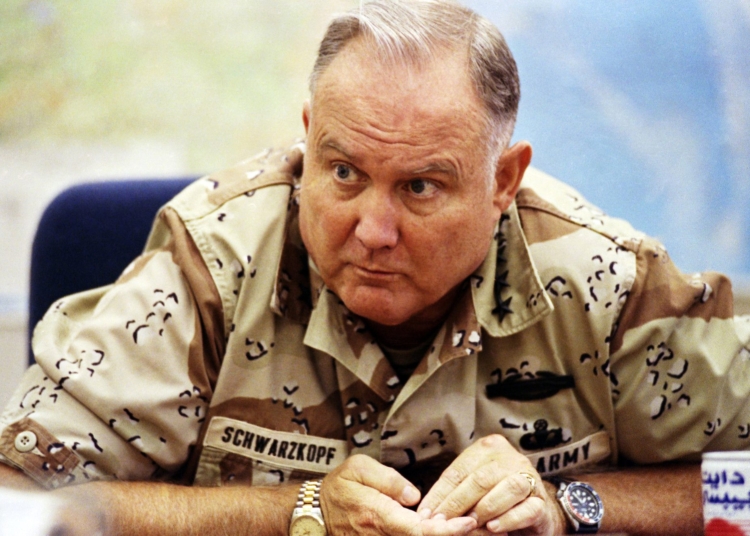The Gulf War, which took place from August 1990 to February 1991, was led by General H. Norman Schwarzkopf Jr., a highly respected military leader. Schwarzkopf’s strategic brilliance and leadership skills played a crucial role in securing victory for the coalition forces. Born into a military family, Schwarzkopf attended West Point and served in the Vietnam War. His experience and expertise earned him a reputation as one of the Army’s most talented officers. In the Gulf War, Schwarzkopf implemented effective strategies, such as a massive air campaign and the innovative “Hail Mary” pass. His leadership style and personal charisma united the allied forces and earned him respect and loyalty from his troops. After the war, Schwarzkopf retired from military service and dedicated himself to philanthropy. His legacy as a military leader and his contributions to international peace and stability will always be remembered.
Norman Schwarzkopf: The Man Who Led the Allied Forces to Victory in the Gulf War
Introduction
The Gulf War, which took place from August 1990 to February 1991, was a major conflict between Iraq and a coalition of 35 nations led by the United States. At the helm of the allied forces was General H. Norman Schwarzkopf Jr., a decorated and highly respected military leader. Schwarzkopf’s strategic brilliance and leadership skills played a crucial role in securing victory for the coalition forces.
Early Life and Military Career
Born on August 22, 1934, in Trenton, New Jersey, Norman Schwarzkopf hailed from a military family. His father, Herbert Norman Schwarzkopf Sr., was a distinguished Army officer who served in both World War I and World War II. Following in his father’s footsteps, Schwarzkopf attended the United States Military Academy at West Point, where he graduated in 1956.
Throughout his military career, Schwarzkopf held various positions and served in the Vietnam War. His leadership abilities earned him numerous accolades, including three Silver Stars for valor in combat. Schwarzkopf’s experience in combat operations and his expertise in military strategy garnered him a reputation as one of the Army’s most talented officers.
The Gulf War
When Iraq invaded Kuwait in August 1990, President George H.W. Bush assembled an international coalition to liberate Kuwait and protect regional stability. At the time, Schwarzkopf was serving as the commander of U.S. Central Command, responsible for American military interests in the Middle East.
Schwarzkopf was appointed as the commander of the coalition forces, known as Operation Desert Storm. His leadership style emphasized detailed planning, clear objectives, and effective coordination among the various nations involved. Schwarzkopf focused on utilizing overwhelming force and exploiting the weaknesses of the Iraqi military.
Strategic Brilliance
Schwarzkopf’s strategic brilliance was evident throughout the Gulf War. He recognized the importance of air superiority and launched a massive air campaign against Iraq, crippling their defenses and eliminating key targets. This allowed ground forces to launch a successful offensive without significant opposition.
Furthermore, Schwarzkopf implemented an innovative military maneuver known as the “Hail Mary” pass, which involved a flanking maneuver to encircle and trap the retreating Iraqi forces during the ground assault. This strategic move prevented the enemy from regrouping and ensured a swift and decisive victory.
Leadership and Personal Charisma
Aside from his strategic brilliance, Schwarzkopf’s leadership style and personal charisma were instrumental in the success of the coalition forces. He possessed exceptional communication skills and had an innate ability to connect with his troops, motivating them to perform at their best.
Schwarzkopf’s dedication to the well-being of his soldiers was evident through his emphasis on minimizing casualties and prioritizing the safety of his troops. This commitment earned him the respect and loyalty of his soldiers, instilling a sense of camaraderie and unity among the allied forces.
Legacy and Aftermath
The Gulf War, led by Schwarzkopf, marked a significant victory for the coalition forces. His exemplary leadership and strategic prowess are still regarded as key factors in the success of the campaign.
Following the war, Schwarzkopf retired from active military service in 1992, leaving behind a legacy of military brilliance and leadership. He dedicated the remainder of his life to philanthropy and became involved in various charitable causes.
Conclusion
General Norman Schwarzkopf’s role in leading the coalition forces to victory in the Gulf War cannot be understated. Through his strategic brilliance, leadership skills, and personal charisma, he united a diverse coalition of nations to achieve a decisive outcome. Schwarzkopf’s legacy as a military leader and his contributions to international peace and stability will forever be remembered and celebrated.












